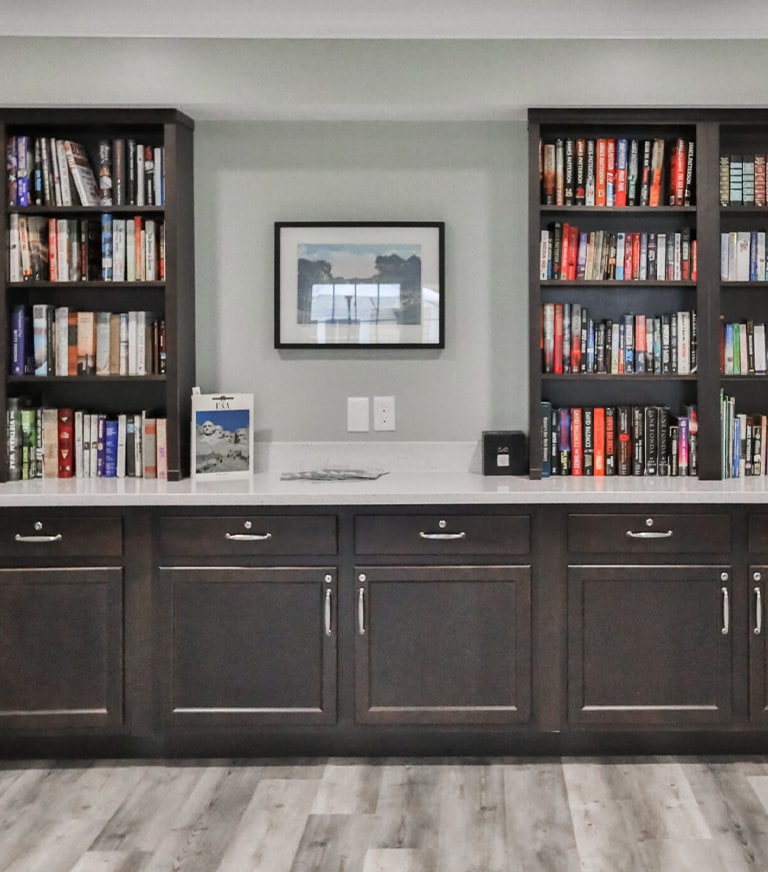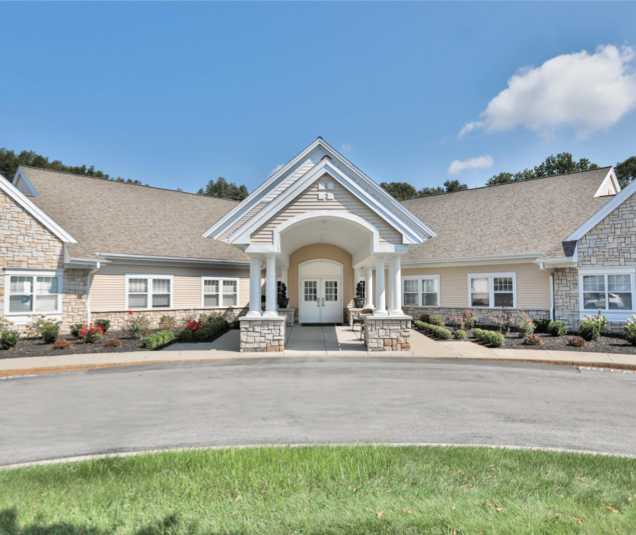Caring for a parent with dementia is rarely straightforward. It often involves navigating the changes in their behavior and managing their daily health and well-being.
However, with the right approach, you can build a strong care plan that supports a parent and yourself as a caregiver. This care plan can include:
- Creating a supportive environment
- Communication strategies
- Day-to-day care
- Self-care for the caregiver
- Seeking professional help
- Financial and legal considerations
Whether you are just beginning to recognize the need for additional support at home for a parent with dementia or looking for solutions like memory care in senior living, a well-thought-out plan can help you every step of the way.
What Is Dementia?
Dementia is not one disease—it encompasses a range of conditions that affect memory, thinking, and behavior. The most common type is Alzheimer’s disease. Each type affects individuals differently, but all share common symptoms that can affect daily life.
Dementia often begins subtly, with early signs that are easy to overlook as normal age-related changes. These can include:
- Forgetfulness
- Difficulty managing everyday tasks
- Changes in mood or personality
- Confusion of time and place
- Poor judgement
As the condition progresses, so do its symptoms, leading to challenges with recognizing loved ones, communicating, or carrying out basic activities.
Building a Strong Care Plan for a Parent with Dementia
A clear diagnosis from a healthcare professional on what type and stage of dementia your parent has can guide decisions about treatment, therapy, and support options and allow you to put systems in place to manage the condition more effectively. A strong care plan can include the following.
Creating a Supportive Environment
A safe, comfortable environment is essential for anyone with dementia. By making small modifications to a parent’s home, you can support their safety and overall quality of life. Here are a few tips:
- Reduce hazards: Remove tripping hazards, install grab bars, and secure rugs or cords.
- Simplify navigation: Use clear labels for rooms or items to reduce confusion.
- Improve lighting: Make sure the home is well-lit to minimize falls or anxiety caused by shadows.
- Encourage familiarity: Surround a parent with familiar objects, photos, and memorabilia for comfort.
Communication Strategies
Talking to someone with dementia can sometimes feel like navigating uncharted waters. They might struggle to express themselves or understand you, leading to frustration for both parties. Here are some communication strategies to foster understanding and reduce confusion:
- Stay calm and patient: Take your time and avoid showing frustration.
- Simplify your language: Use short, clear sentences.
- Maintain eye contact: It helps build connection and focus.
- Focus on emotions, not words: If the words do not make sense, try to understand the feelings behind them.
Day-to-Day Care
Daily considerations to care is an important part of dementia care and can include:
- Medical care: Regular check-ups, medications, and any necessary therapies.
- Social activities: Engagement through hobbies, visits, or community groups to combat isolation.
- Routine: Consistent daily schedules to reduce confusion and anxiety.
Self-Care for the Caregiver
It is easy to focus all your energy on your parent’s needs and forget about your own well-being. But as the saying goes, “You can’t pour from an empty cup.” Prioritizing your physical and mental health is vital to caregiving:
- Take breaks when needed; respite care can provide temporary relief.
- Stay connected with friends and family for emotional support.
- Join a caregiver support group.
- Practice stress-relief techniques such as yoga, meditation, or a favorite hobby.
Seeking Professional Help

At some point, professional care may become necessary. Knowing when to seek help can make all the difference in providing safety and quality of life for a parent with dementia.
Memory care programs, a specialized form of senior living, offer a structured environment where trained staff provide round-the-clock support and activities tailored to cognitive abilities. These communities help alleviate stress for both the caregiver and the individual, offering peace of mind and compassionate, personalized care.
Financial & Legal Considerations
Planning for the future can feel overwhelming, but addressing financial and legal matters early on is crucial:
- Seek legal advice: Work with an attorney to establish power of attorney and advance directives.
- Budget for care: Understand the costs of different care options, including memory care, and explore insurance or government assistance programs.
- Keep records: Maintain a centralized file of medical records, legal documents, and financial information for easy access.
Memory Care That Works for Everyone
Caring for a parent with dementia is a journey that requires strength, patience, and understanding of their condition. When you provide a supportive environment, and seek the right resources, you can build a care plan that provides stability and dignity. Book a tour with Peregrine Senior Living at Clifton Park to learn more about our memory care program and how it can benefit your loved one.











Dining at our community is about more than what’s on the plate—it’s about connection, community, and the joy of gathering together.
Our talented culinary team crafts meals that are both delicious and nutritious, offering flavors that comfort and inspire.
From themed dinners to chef demonstrations, each meal becomes an opportunity to savor the moment and celebrate life’s simple pleasures. 🍴
peregrinecliftonpark.com/ ... See MoreSee Less
0 CommentsComment on Facebook
Cheesecake Factory for lunch 🍰🍝 ... See MoreSee Less
0 CommentsComment on Facebook
Carmen and Joe joined us live again for another monthly Peregrine Birthday Party! ... See MoreSee Less
0 CommentsComment on Facebook
The March newsletter is here!
And monthly dinners are back starting with a bang thanks to Home of the Good Shepherd and DJ Mark Hersh. We will have a festive breakfast for St. Patrick's Day with Peregrine Senior Living at Clifton Park, and Saratoga County Department of Aging and Youth Services brings us new programs like Boxing Fitness and an additional Chair Yoga class!
Find the newsletter here: cliftonparkny.gov/document-center/clifton-park-senior-community-center/2026-newsletters/5845-marc...
Town of Clifton Park ... See MoreSee Less
0 CommentsComment on Facebook
Today we celebrate the caregivers—those whose quiet strength and unwavering compassion bring comfort to so many.
We see the difference caregivers make every day: holding a hand, sharing a smile, or offering reassurance when it’s needed most. 💕
Your dedication reminds us that true care goes beyond tasks—it’s an act of love, patience, and humanity.
Thank you for all you do to make the world a more compassionate place.
peregrinecliftonpark.com/ ... See MoreSee Less
0 CommentsComment on Facebook
We had some special visitors at our Mardi Gras Party yesterday🐷💜💚💛 ... See MoreSee Less
3 CommentsComment on Facebook
Happy Valentine’s Day! ❤️
Love takes many forms—between partners, friends, families, and even across generations.
Today we celebrate the love that fills our community: the care shared between residents and team members, the laughter that brightens our halls, and the sense of belonging that reminds us we’re never alone.
May your day be filled with connection, warmth, and heart.
peregrinecliftonpark.com/ ... See MoreSee Less
0 CommentsComment on Facebook